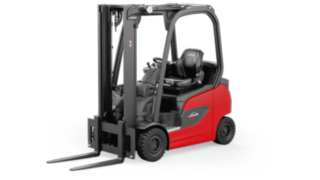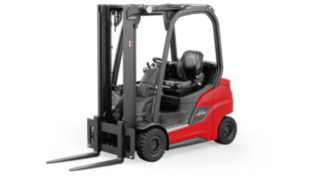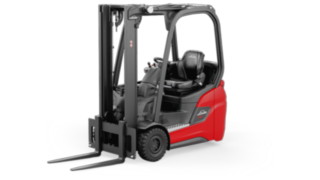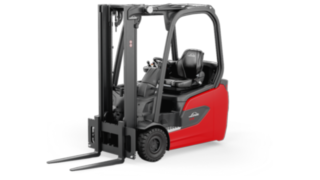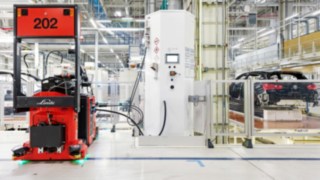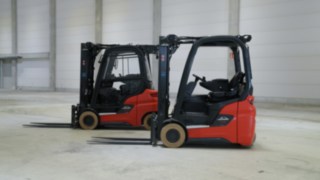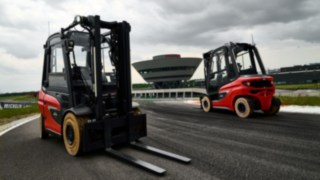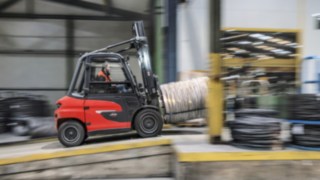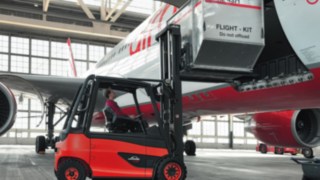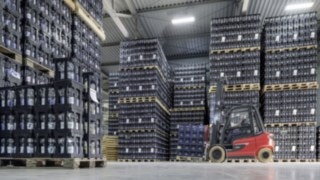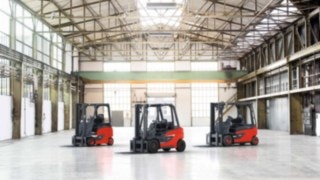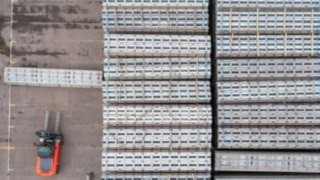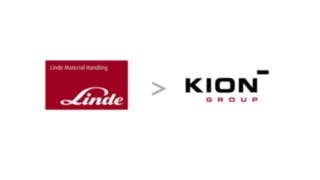Heavy labour for lithium-ion forklifts at Cölner Hofbräu P. Josef Früh KG
Full of tricks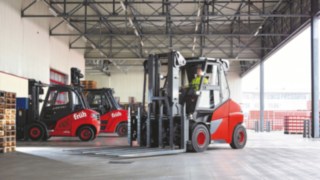
Day after day at Cölner Hofbräu P. Josef Früh KG in Cologne-Feldkassel Linde's combustion forklifts show what tricks they have. Or rather, how many crates they have on their forks. Each day, thousands of litres of ‘Kölsch’ beer are brewed and loaded here, so the trucks certainly have their work cut out. Is it still possible to do all this with a lithium-ion truck? The Cologne-based company wanted to find out.
There’s no need to beat around the bush: the city of Cologne is a universe all of its own; and its residents – known as 'Kölner' – are a different species altogether. Whether it’s the cheerful nature of those from the Rhineland – beloved throughout Germany – the legendary carnival, or the equally legendary Kölsch, there’s something special about this cathedral city. And it goes without saying that the many pubs here must only ever serve this palatable brew in the special 0.2-litre glass known as the ‘Kölner Stange’. Most drinkers will have downed their glass before you can even say the full name of one of Cologne’s true traditional breweries, Cölner Hofbräu P. Josef Früh KG. The company, founded in 1904, is now run by the fifth generation of the family and has since become one of the most important manufacturers of Kölsch operating in this city on the Rhine. At the same time Früh KG – along with its long-standing original establishment, just a stone’s throw from Cologne cathedral – also runs various other gastronomical establishments throughout the city, all serving the firm’s very own beer. Since 1987, it has been brewed at the production location in Cologne’s Feldkassel district, where the company still uses the same traditional recipe, in line with the German Purity Law. But despite this focus on tradition, Cölner Hofbräu P. Josef Früh KG is refreshingly open-minded when it comes to new approaches to logistics.
“Et bliev nix wie et wor”
This dialect phrase, meaning “nothing remains as it was”, is succinctly summarised in Article 5 of the official ‘Kölsches Grundgesetz’ (Cologne Constitution – a collection of colloquial expressions), and is wholeheartedly subscribed to by those responsible for innovation at the Früh brewery. “We rely exclusively on Linde for our internal material flow and, here, specifically on LP gas forklift trucks,” explains Head of Logistics Hans-Peter Burbach, adding a satisfied “with great success”. Nonetheless, the decision was made in close collaboration with the responsible dealer, Pelzer Fördertechnik, to conduct a three-week test with a lithium-ion truck as part of everyday operations. The beverage industry and electric forklift trucks is a combination that may still appear unusual for many old hands in the logistics sector, says Pelzer sales rep Rainer Kohaus: “Long assignments, high tonnages – for many, this is still not something you would associate with electric drives. This makes it all the more pleasing that we here at Früh are able to prove quite the opposite, and in pretty impressive fashion.” But we’ll come back to that.
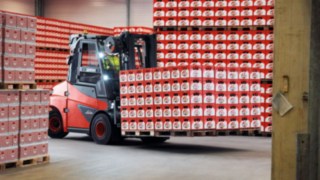
Beer in abundance
If you were to serve all the Kölsch produced in a year by Cölner Hofbräu P. Josef Früh KG in the traditional 0.2-litre ‘Stangen’ glasses, it would even make the ‘world’s longest bar’ – the nickname for the pub district in neighbouring Düsseldorf – seem like small beer in comparison. “That’s only around 180 million glasses”, jokes Hans-Peter Burbach. “With around 370,000 hectolitres of Früh Kölsch produced each year, we rank in the top three Kölsch breweries according to volume”, explains the logistics specialist, as he shows us around the production location in the north of the cathedral city: Almost endless rows of pallets, beer crates, barrels and trays of cans are stacked up in the spacious halls here. After all, the ‘delivery methods’ for this beloved beverage are manifold: bottles and cans for beverage wholesalers and commercial chains, various sizes of barrels for public houses, and special 90-litre wooden casks from which the drinkable brew is served at the original establishment. “This means counterbalanced trucks are indispensable for our processes”, says Burbach. “Alongside production supply, the trucks are primarily used to load and unload our own delivery trucks as well as our customer’s trucks – this means that over 90 percent of our customers send their trains to the depot, we then unload the empties and refill the trailers with fresh goods.”
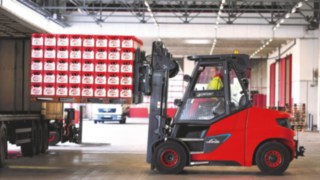
This task is carried out by a total of four eight-tonne Linde H80 trucks, each fitted with long forks which enable them to handle six fully loaded pallets at the same time. They are assisted by five five-tonne trucks with short four-pallet forks that are used for block stacking. It is in precisely this troublesome spot that Früh KG recently broke the familiar routine: “When we found out from our Linde contractual partner, Pelzer Fördertechnik, that Linde Material Handling now also offers lithium-ion versions for high tonnages, we wanted to take a closer look”, states Head of Logistics Burbach.
Very good for heavy goods
If it ain’t broke, don’t fix it? No way! This particular part of the Cologne Constitution does not apply to Früh KG, as became evident extremely quickly after the first trial runs with the Linde E80, in both indoor and outdoor areas. My colleagues and I don’t really tend to move lightweight loads, so a fully loaded pallet can weigh up to 1000 kilos", says forklift operator Andreas Marx.
I was really surprised what light work the Linde E80 Li-ION made of the task. You really can’t tell the difference between this and the combustion engine version!
This is not entirely true, as the lithium-ion truck is actually much quieter than its fuel gas counterpart, much to the delight of the warehouse employees. “It’s great, as not only is there much less noise while we work, but we are also able to be more acoustically aware of our surroundings,” says the experienced forklift truck expert. In combination with the Linde BlueSpot, which, incidentally, is also installed on all forklift trucks at Früh KG, the risk of accidents is therefore significantly reduced.
So, the eight-tonne electric forklift truck with lithium-ion battery already has bonus points for performance, safety and noise level. But how do things look in terms of endurance? “Until now, this was the exclusion criterion for lead-acid trucks, as otherwise we would have had to deal with changing and storing the battery”, explains Head of Logistics Burbach. “The forklift trucks are generally in operation for around ten hours a day here, so lithium-ion technology is essentially perfect. We can charge the trucks during the half-hour breaks, which gives us more than enough power for the remaining operating hours. They are then fully charged overnight.”
Here to stay
So, everything looks rosy for the lithium-ion trucks? According to forklift driver Andreas Marx, there's no question:
I’ve been driving combustion trucks for 22 years and, after three weeks of lithium-ion, I would now prefer to keep the Linde E80 Li-ION.
The conditions are extremely favourable in any case, especially as the brewery even operates its own block-type thermal power station on site. Burbach: “Before switching to lithium-ion, we would need to ensure that we won’t exceed the performance peaks, if multiple trucks are charging at the same time.” He adds that, as is so often the case, the path taken in the future will be decided by cost-effectiveness. “We are currently running calculations based on our conditions: we buy all of our trucks, use them for ten years, operate them for around 1000 hours per year and have them repaired and serviced in coordination with our Linde network partner Pelzer. In terms of service, the lithium-ion trucks are scoring well in comparison to the IC trucks thanks to their easy servicing. The test assessments and calculations over the next few months will tell us everything else we need to know.” Or, as the Kölners say: Et kütt wie et kütt! (Whatever will be will be)
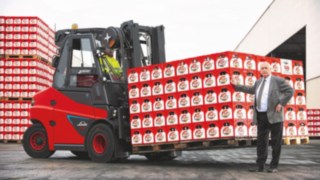
Cölner Hofbräu P. Josef Früh KG
Cölner Hofbräu P. Josef Früh KG is one of the best-known Kölsch breweries in the Rhineland area. The family-run company is now managed by the fifth generation and employs around 450 people across production, administration, gastronomy and the hotel industry. For decades now, the company has exclusively used Linde trucks for internal material flow at its brewery site in Cologne’s Feldkassel district, including four eight-tonne H80 LP gas trucks and five five-tonne H50 LP gas trucks, both for loading and for block storage. Another four 2.5-tonne H25 LP gas trucks perform their duties in barrel production and in events. In addition, there are also another four E16 electric forklift trucks and two T16 pallet trucks, along with six further Linde industrial trucks. The trucks are serviced and maintained by dealer Pelzer Fördertechnik.
